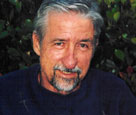Irish American writer, activist says Irish won't disappear

Activist and former U.S. Senator Tom Hayden spoke Monday evening.
According to Irish American author and activist Tom Hayden, many Irish immigrants, past and present, have attempted to disappear into North American culture.
In a lecture at Concordia on Monday, Hayden said that the Irish diaspora was met by a relentless drive to assimilate the Irish in North America. But, for the most part, the immigrants themselves shared that desire, trying hard to bury the past.
“The general notion, over a very long period of time, was to make the Irish disappear: into whiteness, into Britishness; anything but Irish. That is a pattern, and one which applies to other national, racial, ethnic groups.” Hayden said the struggles of the Irish immigrant experience must be remembered, despite the efforts of the early generations to distance themselves it.
“The fact that the vast majority of people in the mental institutions in New York state were Irish; the fact that the majority of prostitutes on the streets of New York were young Irish Catholic girls; that the Irish were forced into backbreaking labor on the canals and bridges, or into crime in order to survive … all of these memories, and more, should not disappear, but be recovered.”
Hayden contends, citing a dearth of adequate Irish studies programs, that the school curriculums in the U.S. are designed to dampen or eradicate these memories.
If they disappear forever, “we would desecrate the memory of those who struggled in order to make our opportunities for a better life possible. We will also be deprived of a great resource for understanding the identical suffering and struggles around the world today.
“Finally, we will make it easier for perpetrators of past injustices to inflict today the same kinds of suppression of human rights and cultural heritage, and [perpetuate] the shame and self-hatred on the two billion people on this earth who labour for less than two dollars a day.”
Such a collective amnesia would make the Irish “orphans in history, with no guide as to how to navigate the 21st century.”
Hayden was born in the United States of parents who had fled Ireland to seek a better life in America. He says that they were also fleeing memories, like many Irish immigrants, burying the past in order to bury the pain.
“The real immigration was from a shame and degradation to respectability. My parents wanted to know nothing about the past, and to pass on this nothingness to me. And they succeeded. I was raised unconscious, which meant that I accepted a mainstream American identity.”
Hayden began to educate himself about his heritage and his family tree in the 1960s, inspired by the consciousness-raising and challenges to the status quo of that time.
“The ’60s made me Irish. That decade was about challenging identities. Women were challenging the patriarchy; blacks and latinos were challenging white supremacy; gays and lesbians were challenging the nature of manhood and masculinity. Everywhere I turned, I found that part of the identity that I had been given was being taken away. I became vulnerable, or open, to the possibilities of a new identity.”
Hayden said that for his generation, the immigrant past is far enough behind that many Irish today can embrace their heritage. Ironically, the distance of the past may bring it much closer. That process has been helped along by a recent influx of Irish culture which broke through to the mainstream, such as the rock group U2 and the travelling Riverdance show.
Hayden concluded by calling for a society that is increasingly willing and able to accommodate the hopes and dreams of its immigrants, rather than submerge them in a tide of assimilation.
“The thing about the Irish is that we’re dreamers. Modernization has little room for dreaming; fantasies yes, but dreams are dangerous. We need a country that will become more internationalist, by assimilating into the dreams of its immigrants, including the Irish dream, which is one of spirituality, poetry, and learning in everyday life.”
As a young man, Hayden worked in the civil rights and anti-war movements, and became the ideologue of the New Left. He famously married, then divorced, actress and fellow radical Jane Fonda, then served several terms as a U.S. senator.
His latest book is entitled Irish on the Outside: In Search of the Soul of Irish America, of which the paperback edition was published this year. His lecture this week at Concordia was presented by the Centre for Canadian Irish Studies.